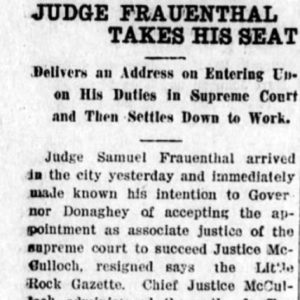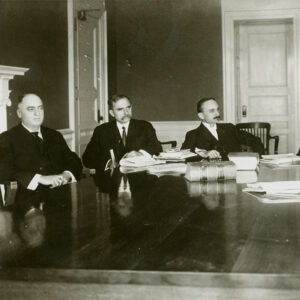calsfoundation@cals.org
Samuel Frauenthal (1862–1935)
Samuel Frauenthal was a prominent lawyer and judge in Arkansas in the late nineteenth and early twentieth centuries. With his appointment in 1909, he became the first person of the Jewish faith to serve on the Arkansas Supreme Court.
Samuel Frauenthal was born on August 8, 1862, in Louisville, Kentucky. He was one of seven children of Jacob and Yetta Frauenthal, both of whom had been born in Bavaria, Germany. The family moved to Russellville, Kentucky, and Frauenthal received his early education in the Russellville schools. He then attended the local Bethel College, from which he received a BA in 1880. Following his graduation from Bethel, he pursued the study of law, although there are conflicting reports about whether he read the law privately or attended law school at the University of Louisville.
Upon completion of his studies, he was admitted to the bar in Russellville. The following year, he moved to Arkansas and opened a practice in Conway (Faulkner County). For a number of years, he was a law partner with one of Conway’s leading citizens, Colonel George W. Bruce, who, in addition to his legal practice, owned a local newspaper as well as being a driving force in the founding of both Hendrix College and Central Baptist College. Frauenthal was also active in the local Conway community, serving as a member of the local board of education and the town council. His involvement with the Democratic Party led to his serving several times as a delegate to the party’s state convention.
On February 1, 1909, fellow Conway resident Governor George Donaghey named him an associate justice on the Arkansas Supreme Court, filling the vacancy caused by the elevation of Edgar A. McCulloch to chief justice. In a special election in July 1909, the choice was confirmed, and Frauenthal became the first Jew to serve on the state’s highest court. He remained on the bench until January 1, 1913, when he resigned, indicating that he preferred working with individual clients rather than on the public stage. His opinions were noteworthy for their clarity and directness, as well as for their commitment to equity and justice, and observers noted that he demonstrated an impressive knowledge of both the law and the legal precedents upon which the court drew.
Upon leaving the bench, he returned to private practice, and in 1918 he entered into partnership with Ector R. Johnson, establishing the firm Frauenthal & Johnson. He also served as director of the Bankers Trust Company and the Bank of Conway, and was a member of the board of a number of local corporations. Frauenthal and a friend, Robert Fones, established a plant that produced metal harrows. The company helped sustain a new power plant until the demand for electricity grew sufficiently to make the plant self-sustaining.
Frauenthal was a member of the Little Rock Bar Association and the American Bar Association, as well as the Masons, B’nai B’rith, and the Elks. In addition, he served as a member of the Conway Fire Company.
Frauenthal, who never married, died on December 4, 1935, in Little Rock (Pulaski County). He is buried in the Oakland & Fraternal Historic Cemetery Park in Little Rock.
For additional information:
Biographical and Historical Memoirs of Faulkner County, Arkansas. Chicago: Goodspeed Publishing Co., 1889. Relevant portion online at http://www.mygenealogyhound.com/arkansas-biographies/ar-faulkner-county-biographies/samuel-frauenthal-genealogy-faulkner-county-arkansas-conway-ar.html (accessed November 5, 2021).
Hempstead, Fay. Historical Review of Arkansas: Its Commerce, Industry and Modern Affairs, Vol. 2. Chicago: The Lewis Publishing Company, 1911.
Herndon, Dallas Tabor. Centennial History of Arkansas, Vol. 3. Chicago: S. J. Clarke Publishing Company, 1922.
LeMaster, Carolyn Gray. A Corner of the Tapestry: A History of the Jewish Experience in Arkansas, 1820s–1990s. Fayetteville: University of Arkansas Press, 1994.
William H. Pruden III
Ravenscroft School
 Early Twentieth Century, 1901 through 1940
Early Twentieth Century, 1901 through 1940 Law
Law Samuel Frauenthal Address
Samuel Frauenthal Address  Supreme Court Members
Supreme Court Members 




Comments
No comments on this entry yet.